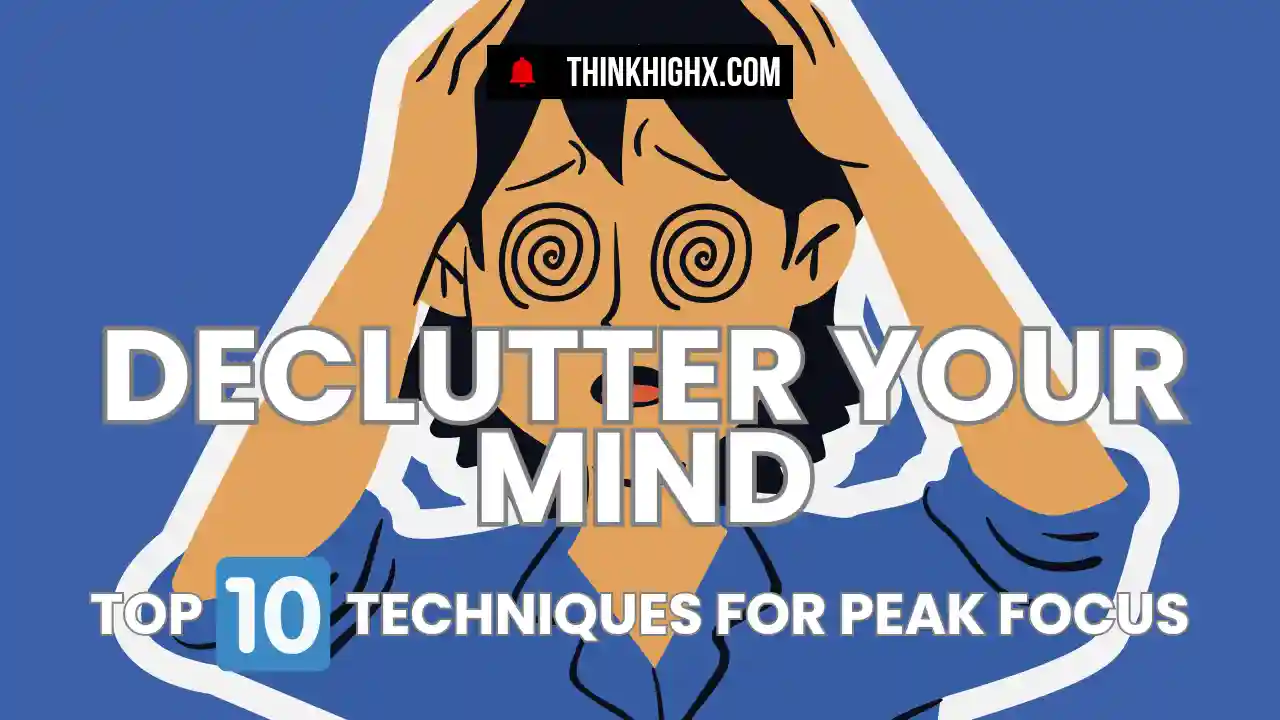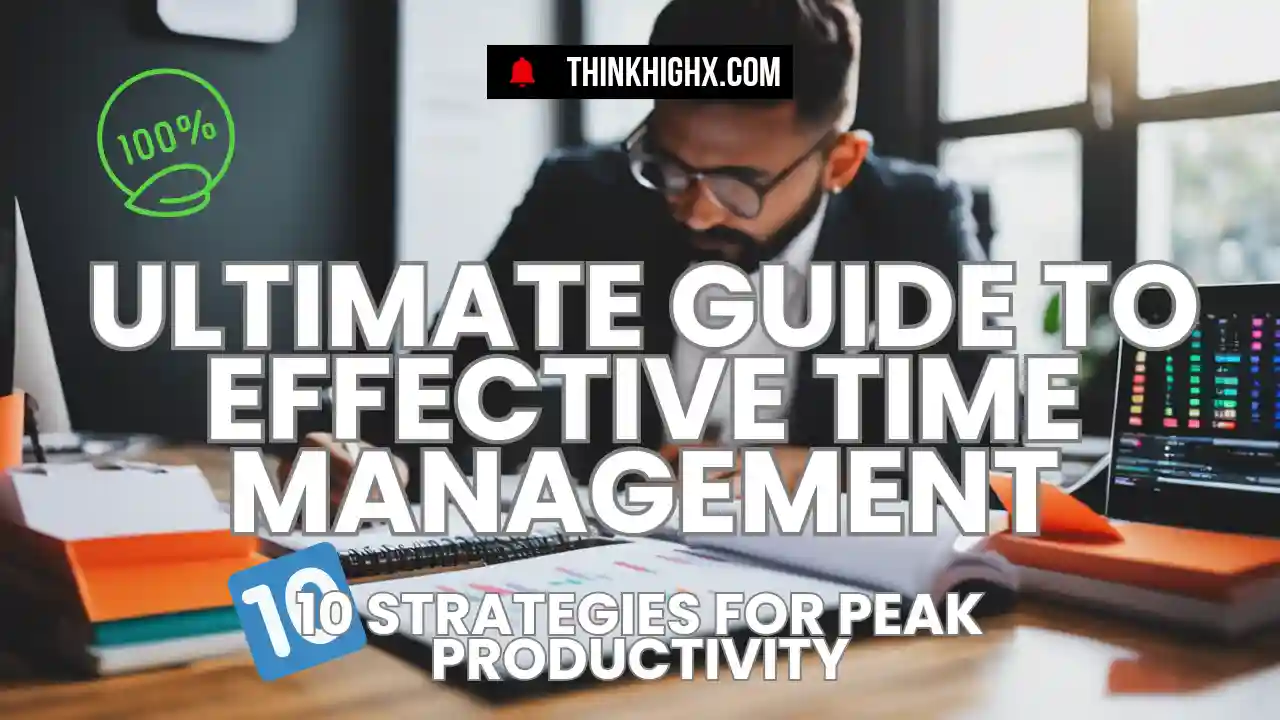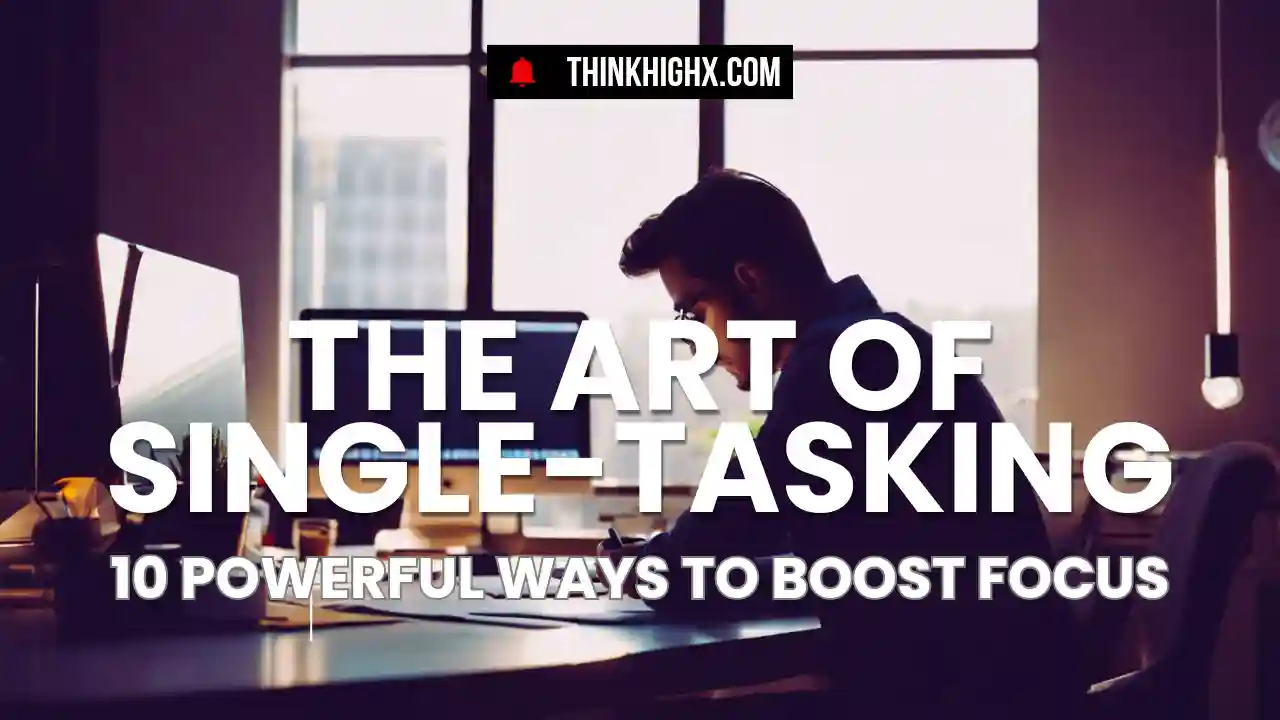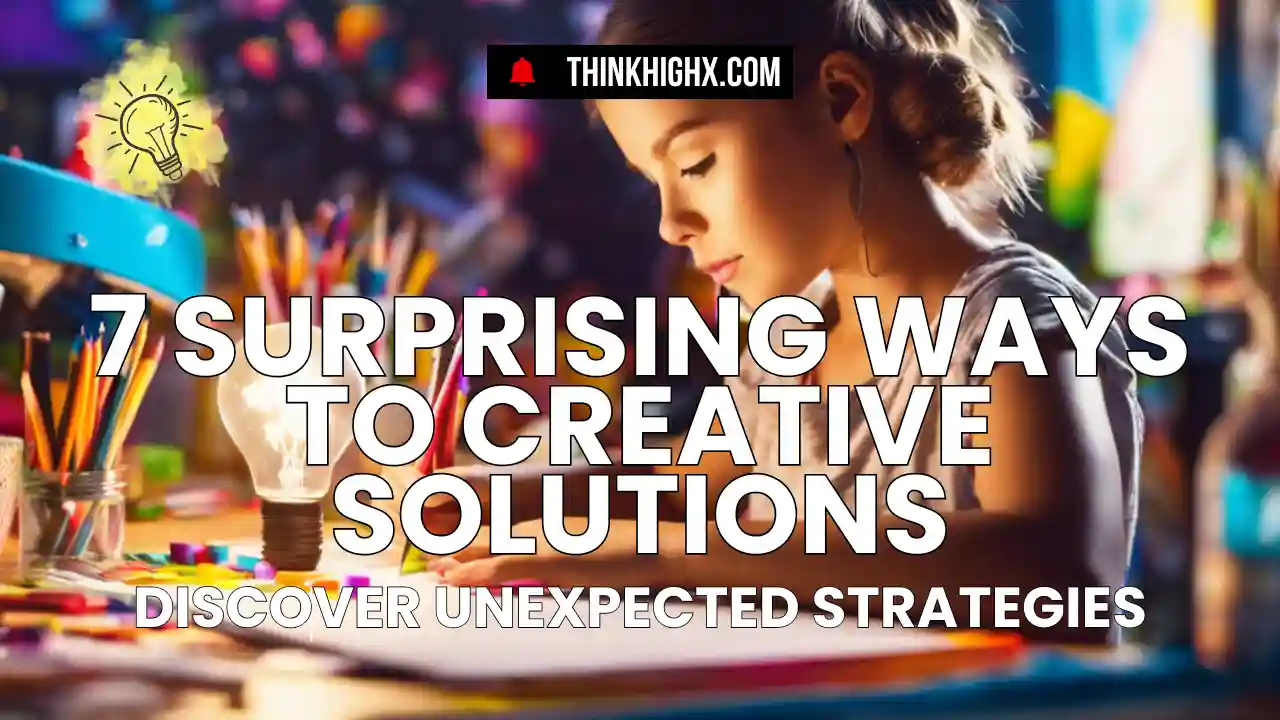Declutter Your Mind: Top 10 Techniques for Peak Focus
Table of Contents

"Clutter is found in so many shapes and sizes. We can find it on our kitchen tables, under our beds, in our cars, and in our heads."
Katrina Mayer
Introduction to Declutter Your Mind
Imagine starting your day with a hundred things racing through your mind—unfinished tasks, upcoming deadlines, personal worries. Mental clutter builds up, leaving you stressed and unfocused.
Define “Decluttering the Mind”: Decluttering your mind involves clearing away unnecessary thoughts, distractions, and worries to create mental space for what truly matters. It’s about regaining control over your thoughts.
Benefits of Mental Decluttering: By decluttering your mind, you improve focus, reduce stress, and boost emotional well-being. With a clearer mind, you can enhance your productivity and maintain better work-life balance.
Importance of Mental Clarity: Mental clarity is key to optimizing focus, decision-making, and creativity. It directly impacts your overall well-being, leading to a healthier, more productive life.
Overview: In this article, you’ll discover practical strategies to declutter your mind, from mindfulness practices to digital detoxes, and gain actionable tips to boost your mental clarity and well-being.
Understanding Mental Clutter
What is Mental Clutter?
Mental clutter refers to the overwhelming and disorganized thoughts that cloud your mind, preventing focus and mental clarity. It can come from stress, distractions, worries, or excessive multitasking. As today’s world speeds up, mental clutter has become a growing issue due to constant information overload and the pressures of modern life.
Effects of Mental Clutter on Productivity and Well-Being
Mental clutter negatively affects your productivity, making it harder to concentrate on tasks and achieve goals. It also harms relationships by increasing stress and reducing emotional availability. Over time, it impacts well-being, leading to burnout and anxiety.
Watch: Declutter Your Mind
Top 10 Techniques to Declutter Your Mind and Gain Clarity
Life today can feel overwhelming. The constant flow of information, tasks, and distractions can leave your mind cluttered, affecting your mental clarity and overall well-being. Decluttering your mind is not just about clearing out physical spaces; it is about mental organization and creating calm within. In this article, I will share 10 powerful techniques to help you declutter your mind and gain clarity. Whether you are dealing with stress, anxiety, or just feeling mentally scattered, these techniques will provide you with the tools to regain focus.
1. Breathing Techniques for Immediate Calm
When your mind feels overwhelmed, one of the quickest ways to regain control is through breathing techniques. The breath is a powerful tool to reset your mind and reduce anxiety instantly. Mindful breathing not only calms the mind but also helps you focus on the present moment, bringing mental clarity. Here are two effective breathing exercises you can try right now:
Box Breathing
This technique is simple and can be done anywhere.
- Breathe in through your nose for 4 seconds.
- Hold the breath for 4 seconds.
- Exhale through your mouth for 4 seconds.
- Hold again for 4 seconds.
Repeat this cycle 4-5 times. Box breathing helps regulate your nervous system, reducing stress and promoting clarity. I find that whenever I am feeling overwhelmed, just a few minutes of box breathing allows me to regain focus.
4-7-8 Breathing
This breathing exercise is effective for immediate relaxation.
- Breathe in through your nose for a count of 4.
- Hold the breath for 7 seconds.
- Exhale slowly through your mouth for 8 seconds.
This method works because it slows your heart rate and lowers cortisol levels, leaving you calm and more focused. I have used this technique many times to quiet my mind before bed, and it works like magic to settle racing thoughts.
2. Brain Dumping: Release Every Thought on Paper
Sometimes, we get stuck in our heads, holding onto too many thoughts. Brain dumping is a technique where you write down every thought cluttering your mind, no matter how small or random. The goal is not to organize these thoughts right away, but simply to release mental weight. Here’s how you can try it:
- Grab a pen and paper.
- Set a timer for 10-15 minutes.
- Write down everything that comes to mind—ideas, tasks, worries, anything.
You will find that the act of writing releases the pressure in your mind. I use brain dumping whenever I feel mentally overloaded. By transferring my thoughts onto paper, I gain clarity and can focus on what truly matters. It is like decluttering a messy room, except this time, the room is your mind.
3. Digital Detoxing for Focus
We live in a digital age where screens dominate our attention. Constant notifications, emails, and social media can clutter your mind without you even realizing it. To declutter your mind, a digital detox is essential. You do not have to completely disconnect, but reducing screen time and managing notifications can significantly improve mental clarity.
Tips for a Successful Digital Detox:
- Turn off non-essential notifications. Only allow the most important apps to send you alerts.
- Schedule phone-free time during the day, especially during meals or when you are working on important tasks.
- Unfollow unnecessary accounts or social media pages that do not add value to your life.
I found that limiting my screen time after 8 PM allowed me to sleep better and wake up feeling mentally refreshed. Try it for yourself; you will be surprised how much clearer your mind feels.
4. Mind Mapping and Visualization
Mind mapping is a visual tool that helps you organize your thoughts and ideas. If you are feeling overwhelmed by tasks or projects, creating a mind map allows you to break down complex thoughts into manageable parts. The beauty of this technique is that it mimics the natural way your brain processes information. Here is how you can start:
- Write a central idea or problem in the middle of a blank page.
- Branch out from the center with related ideas or tasks.
- Use colors and symbols to make connections between thoughts.
By visually organizing your thoughts, you can gain better planning and creative clarity. Visualization can take this a step further by imagining the steps you need to take, helping you mentally rehearse solutions. I often use mind mapping when I feel lost in a project. It helps me see the bigger picture and find a clear path forward.
5. Single-Tasking: Focus on One Thing at a Time
Multitasking has become the norm in today’s fast-paced world, but it often leads to mental clutter. Studies have shown that single-tasking, or focusing on one task at a time, leads to better results and greater mental clarity. Here is why:
When you multitask, your brain constantly switches between tasks, which can leave you feeling scattered and drained. On the other hand, single-tasking allows you to give your full attention to one thing, increasing your efficiency and reducing mental clutter.
How to Practice Single-Tasking:
- Prioritize your tasks. Focus on the most important one first.
- Set a timer and dedicate a block of time (e.g., 25 minutes) to that task alone.
- Take breaks in between tasks to reset your mind.
I used to be a serial multitasker, but I realized that it made me less productive in the long run. Now, I focus on one task at a time, and I can feel the difference in my mental clarity and productivity.
6. Setting Boundaries with Technology and People
Mental clutter is not always about what is going on inside your head; sometimes, it comes from the outside. Setting boundaries, both with technology and with people, is crucial for maintaining mental clarity. Here is how you can do it:
Technology Boundaries:
- Create tech-free zones in your home, such as your bedroom or dining room.
- Establish specific times to check emails or social media, so they do not interrupt your day.
People Boundaries:
- Politely decline social invitations or requests that do not serve your well-being.
- Communicate clearly with others about when you need personal time.
Learning to say no was one of the hardest lessons for me, but once I did, I found I had more time and energy for the things that mattered. Boundaries protect your mental space and give you the freedom to focus on what is important.
7. Exercise and Physical Activity for a Clear Mind
It is no secret that physical activity is closely linked to mental health. Regular exercise not only benefits your body but also has a significant impact on your mental clarity. Exercise releases endorphins, which reduce stress and improve focus. Here are some ways to incorporate exercise into your routine:
- Take a 20-minute walk during lunch to clear your mind.
- Practice yoga or stretching to combine physical movement with mindfulness.
I find that even on my busiest days, a short walk outdoors refreshes my mind and gives me a new perspective on my tasks.
8. Prioritization and Decision-Making Techniques
Mental clutter often comes from having too many choices or responsibilities. Using techniques like the Eisenhower Matrix can help you prioritize your tasks and reduce decision fatigue. Here is how the matrix works:
- Urgent and Important: Do these tasks immediately.
- Important but Not Urgent: Schedule these for later.
- Urgent but Not Important: Delegate these tasks to someone else.
- Neither Urgent Nor Important: Consider eliminating these tasks.
This matrix is a simple but effective way to filter out unnecessary tasks. I often use it when my to-do list feels overwhelming, and it quickly brings clarity to my priorities.
9. Practicing Minimalism in Physical and Mental Spaces
Minimalism is not just about owning fewer things; it is also about creating mental space. By simplifying both your physical environment and your mental processes, you can enjoy greater peace of mind. Start by decluttering your physical space:
- Clear out any items you no longer need or use.
- Keep only what brings you joy or serves a purpose.
The same principle applies to mental clutter. Focus on what matters most and let go of unnecessary thoughts or worries. I embraced minimalism in my workspace, and it made a huge difference in my productivity and mental clarity.
10. Positive Affirmations and Thought Reframing
Your mindset plays a crucial role in mental clarity. Positive affirmations are statements that challenge negative thoughts and replace them with empowering beliefs. For example, instead of thinking, “I cannot handle this,” tell yourself, “I am capable of overcoming challenges.” Similarly, thought reframing involves looking at situations from a new perspective.
- When faced with a problem, ask yourself, “What can I learn from this?”
- Shift your focus from what is going wrong to what is going well.
These techniques have helped me stay positive, even during tough times. By practicing positive affirmations and reframing negative thoughts, you can declutter your mind from negativity and build self-belief.
Innovative Techniques like Neuroplasticity
Emerging trend in the mental health space is the application of neuroplasticity—the brain’s ability to reorganize itself by forming new neural connections. This concept is gaining traction as researchers find new ways to harness neuroplasticity for mental clarity and decluttering. In simple terms, neuroplasticity allows your brain to “rewire” itself, adapting to new thoughts, habits, and behaviors.
How Neuroplasticity Supports Mental Decluttering:
- Breaking Negative Thought Patterns: By consciously changing how you think and react to stress, you can weaken negative mental pathways and strengthen positive ones. This helps declutter your mind from negative thinking loops.
- Creating New Routines: Repetitive behaviors like mindfulness, meditation, or journaling can actually change the structure of your brain, making these actions easier and more natural over time. These techniques essentially rewire your brain for mental clarity.
There is ongoing research into how neuroplasticity can be applied to mental health interventions, and it holds great promise for helping people reduce stress and declutter their minds in innovative ways. This forward-thinking approach allows us to not only understand our brain better but also actively shape it for better mental health.
Expert-Level Practical Insights
If you want to make long-lasting changes to declutter your mind, incorporating practical, daily habits is key. These habits will not only help you maintain mental clarity but also boost your overall well-being. Let me share some actionable insights you can start practicing today.
Declutter Your Mind with Simple Daily Habits
Building daily habits that support mental clarity is one of the most effective ways to declutter your life. These habits are small but powerful. When practiced consistently, they help create a solid foundation for mental well-being.
Key Habits for Mental Clarity:
- Exercise – Physical activity is not just good for your body; it is essential for your brain. Regular exercise reduces stress, improves mood, and helps clear your mind. Even a brisk 20-minute walk can make a big difference in your mental clarity.
- Sleep Hygiene – Sleep is critical for a clear mind. Establishing good sleep hygiene, such as going to bed at the same time every night and avoiding screens before bed, can improve both the quantity and quality of your sleep, allowing you to wake up refreshed and mentally sharp.
- Nutrition – What you eat affects your brain. Incorporating foods rich in omega-3 fatty acids, antioxidants, and vitamins supports brain health and mental clarity. On the other hand, highly processed foods can make you feel sluggish and mentally cluttered.
- Mindfulness Practice – Daily mindfulness exercises, like meditation or deep breathing, help you stay in the present moment, preventing your mind from becoming overwhelmed by future worries or past regrets.
I recommend starting with just one of these habits and gradually building up to more. For example, I began by committing to a 5-minute breathing exercise each morning. Over time, I added short walks and mindfulness breaks during the day. These small steps have significantly improved my mental clarity and focus.
The Power of Focused Attention
One of the greatest enemies of mental clarity is distraction. In our world of constant interruptions, learning to maintain focused attention is essential for decluttering your mind. Techniques like the Pomodoro Technique and deep work can help you train your brain to focus on a single task without being pulled in multiple directions.
The Pomodoro Technique:
- Work in 25-minute intervals: Set a timer and work on a task for 25 minutes without distractions.
- Take a 5-minute break: Once the timer goes off, give your mind a short break.
- Repeat: After four rounds of focused work, take a longer 15-30 minute break.
This technique works because it teaches your brain to focus intensely for short bursts of time. I have found that using the Pomodoro Technique not only boosts my productivity but also helps me declutter my mind by allowing me to fully immerse myself in one task without distractions.
Deep Work:
Deep work refers to periods of intense, undistracted focus on a challenging task. This practice has been proven to enhance cognitive abilities and improve the quality of your work. Here is how you can cultivate deep work:
- Eliminate distractions: Set up your workspace to minimize interruptions. Turn off your phone, close unnecessary tabs, and create a quiet environment.
- Block out time: Schedule deep work sessions on your calendar. Treat this time as non-negotiable, just like any other meeting or commitment.
- Build mental stamina: Start with shorter deep work sessions (30-45 minutes) and gradually increase the duration as your focus improves.
When I started practicing deep work, I noticed that my mind felt less scattered, and I was able to produce higher-quality work in less time. It also helped me develop a sense of control over my mental space, making it easier to declutter distractions.
Conclusion
In today’s busy world, learning to declutter your mind is more important than ever. A cluttered mind can overwhelm you, reduce your productivity, and lead to stress and anxiety. However, by incorporating techniques like breathing exercises, brain dumping, and single-tasking, you can regain mental clarity. Each technique serves a different purpose, whether it is calming your mind, improving focus, or managing information overload.
I cannot stress enough how vital mental clarity is for your overall well-being. When your mind is clear, you can make better decisions, manage your emotions, and enjoy a greater sense of inner peace. Exercise, sleep hygiene, and practicing minimalism in both your physical and mental spaces can all contribute to this clarity. You do not have to tackle everything at once—begin with one or two simple habits, and gradually build from there.
Now that you have an understanding of how to declutter your mind, I encourage you to take action. Start with a small step, like reducing your screen time or practicing mindfulness for a few minutes each day. As you experience the benefits of mental decluttering, you will likely want to explore more strategies and techniques.
If you want more tips and in-depth advice on mental health and clarity, I invite you to subscribe to our updates or explore the additional resources provided below.
Additional Resources
Recommended Book on Mental Decluttering
Reading books by experts can give you deeper insights into how to clear mental clutter and build habits for lasting mental clarity. Here are a couple of recommendations:
- The Power of Now by Eckhart Tolle – This classic focuses on living in the present moment, which is a crucial aspect of mental decluttering. Tolle’s teachings help readers let go of the mental clutter caused by overthinking and worrying about the future or past.
The book offers practical and philosophical insights that can change how you approach mental clarity. If you are looking to delve deeper into mental decluttering books, this is a must-read.
Popular Mental Health Apps:
- Headspace – This app focuses on mindfulness and meditation. It offers guided sessions that help you relax and focus, making it an excellent tool to declutter your mind after a long day.
- Simple Habit – If you are pressed for time, Simple Habit offers quick 5-minute mindfulness exercises. This makes it ideal for busy people looking to squeeze in some mental decluttering during their day.
Using these apps can create a daily habit of mindfulness and help you declutter your mind with technology. I have personally used Headspace, and I found that just ten minutes of daily meditation had a noticeable impact on my focus and overall mental clarity.
These resources are excellent starting points if you are looking to deepen your knowledge or explore specific techniques in a more structured way. By leveraging these declutter your mind online resources, you can find the right tools to support your mental health journey.
Remember, your mental well-being is worth the time and effort. Take advantage of these resources, explore new strategies, and keep refining your approach to mental clarity.
FAQs (Frequently Asked Questions)
How do I declutter my mind?
To declutter your mind, practice techniques like deep breathing, brain dumping (writing down your thoughts), and mindfulness meditation. Reduce distractions through digital detoxing and focus on single-tasking. Incorporate regular exercise, healthy sleep, and positive affirmations to maintain mental clarity and stay grounded.
Is Declutter Your Mind worth reading?
Yes, Declutter Your Mind is worth reading if you struggle with overthinking and stress. It offers practical advice on how to manage your thoughts, reduce mental clutter, and improve focus through mindfulness, habit-building, and other simple, effective strategies.
What is the book Declutter Your Mind about?
Declutter Your Mind is about managing overwhelming thoughts and reducing mental clutter. It provides practical techniques to improve focus, mindfulness, and emotional control. The book covers topics like mindfulness, simplifying your life, and reducing stress by addressing mental habits and negative thought patterns.
How do I declutter my mind from negative thoughts?
To declutter negative thoughts, practice mindfulness and reframing techniques. Challenge negative thinking patterns, replace them with positive affirmations, and focus on the present moment. Engage in physical activities, journal your thoughts, and practice gratitude to shift your mindset and promote mental clarity.
How to declutter in 20 minutes?
In 20 minutes, declutter your space by setting a timer and focusing on one area or task. Organize items into keep, donate, and discard piles. Quickly clear surfaces, throw away unnecessary items, and organize essentials. This brief focused effort can make a noticeable difference in your mental and physical environment.
What are the 5 C's of negative thinking?
The 5 C’s of negative thinking include: Criticizing yourself, Catastrophizing situations, Comparing yourself to others, Creating unnecessary drama, and Constant worrying. These habits trap you in a cycle of negativity, making it harder to focus and declutter your mind.
How do I stop overthinking negatively?
To stop negative overthinking, practice mindfulness by focusing on the present moment. Challenge irrational thoughts and replace them with positive affirmations. Engage in physical activities to distract and calm your mind. Use techniques like deep breathing and the Pomodoro Technique to help you focus and break the overthinking cycle.




